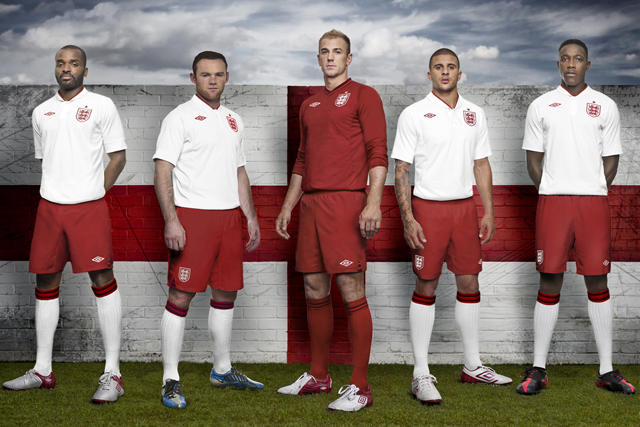When Umbro, a relative minnow, was bought by the world's biggest sporting goods company, Nike, in 2007, the 88-year-old UK kit-maker was given a glimpse of a brighter future.
A golden age loomed for the brand, with Nike's objective to revitalise it through launches such as 'Tailored by England'. Fans no longer had to settle for M, L or XL, but instead could have shirts 'tailored' by chest size, and in aspirational styles that were more akin to casualwear.
Founded in 1924 in Wilmslow, Cheshire, as Humphrey Brothers Clothing, Umbro has kitted out England teams since 1952 and decked out this year's Premier League-winner, Manchester City. Its current contract with the England team stretches to 2018. Alas, Nike couldn't quite work the same magic as it had with Converse, following its acquisition in 2003. While the latter is considered by Nike as one of its core complementary brands and offers 'significant potential' for growth, Umbro has been put up for sale.
In 2009, Nike admitted that 'projected future cash flows had fallen below the levels we expected at the time of acquisition', forcing it to take an impairment charge of $401m on the investment.
So, Nike's decision to offload the brand is of little surprise. However, with Sports Direct one of the frontrunners to acquire Umbro, what lies ahead for the heritage brand?
We asked ex-Manchester City chief marketing officer David Pullan, and the Football Association's former group head of marketing Simon Freedman, now brand director for Lucozade Sport, whether Umbro can return to full fitness.
UMBRO: THE FIGURES
$582m - amount Nike paid for Umbro in 2007
$401m - impairment charge taken by Nike in 2009
$224m - estimated annual sales*
*estimate by Citigroup
DAVID PULLAN, FORMER MANCHESTER CITY CHIEF MARKETING OFFICER
Nike bought Umbro with the intention of replicating the success of Converse. The problem was that while Converse was a complementary product to Nike, Umbro overlapped with Nike Football.
Nike had the big endorsement deals and the 'world's most famous club' kit deal; Umbro had John Terry and Blackburn Rovers. The lynchpin was meant to be England and its famously loyal partnership with Umbro. Sadly for Nike, the deal coincided with the most discredited period in English national football for decades.
The Manchester City partnership was a real win-win with two brands (supposedly) on a growth trajectory. The product was excellent and Umbro's technology was phenomenal. However, the brand had not recovered in the UK from years of the 'cheap socks in buckets outside JD Sports' effect.
Umbro did a lot right; the digital strategy was cutting edge, the understanding of the brand history exemplary. Sadly, Nike seems to have been unable to provide the breathing space for Umbro to build a credible position for the future. That Man City will switch to Nike at the end of next season says everything about which is the step-child in the brand family.
REMEDY
- Umbro's next owners must build the consumer story from the brand's legacy.
- The offering needs to be clear - be it performance product or 'sports casual' fashion - with a definite sense of where it can compete.
- Umbro can be the global brand for football purists but clarity of vision is necessary.
SIMON FREEDMAN, BRAND DIRECTOR, LUCOZADE SPORT (former group head of marketing, the FA)
Brazil won the World Cup playing in an Umbro shirt as recently as 1994. During the 1966 tournament, 15 of the 16 competing teams wore Umbro. It is a measure of how far its market share and leadership in its football heartland has fallen, that it now kits out just three of the 16 teams at Euro 2012.
Umbro more or less invented sports apparel in the 20s, decades before Adidas or Nike was born. However, competition in this market has grown markedly in the past 20 years, and while Nike and Adidas have continued to grow revenues, Umbro has found it more challenging.
The future for Umbro is uncertain. Mike Ashley's Sports Direct business is reportedly the frontrunner. Ashley's 'pile it high, sell it cheap' approach (the England shirt is discounted by 70% in Sports Direct) could not be further from the direction that Nike sought for Umbro since its 2007 acquisition.
REMEDY
- Protect Umbro's British brand heritage. Retain the England football contract and acquire other famous British sporting properties. Use its St George's Park partnership to find the next generation of players who could become brand ambassadors.
- Drop associations with clubs such as Blackburn and find more renowned partners in sport, and potentially fashion, to grow equity and visibility.
- Umbro's share of voice is low. Reconsider untapped distribution channels (eg grocery) to boost revenues to reinvest in the brand.
- Resist Sports Direct's advances. Seek a buyer that will invest for growth.



